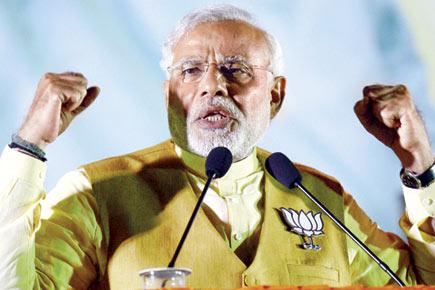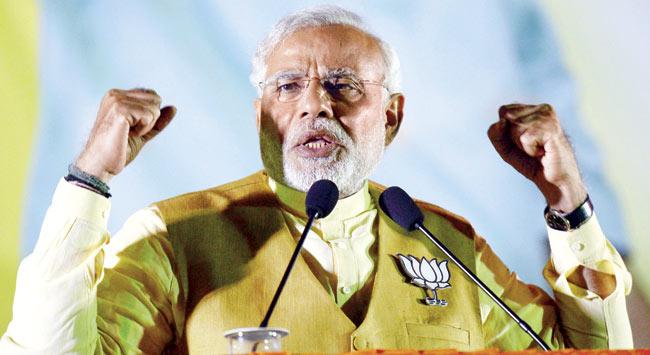It was November 25, 2009, in Washington DC. Prime Minister Manmohan Singh was midway through his visit to the American capital, and everything seemed to be going right

 It was November 25, 2009, in Washington DC. Prime Minister Manmohan Singh was midway through his visit to the American capital, and everything seemed to be going right.
It was November 25, 2009, in Washington DC. Prime Minister Manmohan Singh was midway through his visit to the American capital, and everything seemed to be going right.
ADVERTISEMENT
It was a day before the first anniversary of the Mumbai attacks, and my Delhi Bureau was pestering me to get a reaction from the prime minister.
Given the time difference, I needed the reaction a day ahead. The PMO official, quite irritated that I would want a reaction on 26/11 instead of the nuclear deal, ticked me off. Yes, that is how officials become. They don’t see the obvious.

Now, we have a communicator as a prime minister, who connects with the masses like nobody else has in the recent past. Hopefully, he will keep up the level of interaction with the people who voted for him and those who didn’t. Pic/AFP
I tried explaining to him from his perspective, that back home in India, people wanted to know that the prime minister cared, whether he brought it up with President Obama, may be just one sentence. Tired of my badgering, he gave me a bland one-line statement on behalf of the prime minister.
That statement ran on TV channels in the morning bulletins, with anchors clearly angry that the prime minister was not in sync with the national mood on the first anniversary of the 26/11 terror strikes. The PMO’s priority was the nuclear deal; they could not understand why the media persisted on domestic issues during the foreign visit of a prime minister.
A few hours later, at an interaction with the Indian media, the prime minister gave a more comprehensive statement (strangely it is missing from the Indian embassy’s archives). But, he was late in responding and back home the damage had been done. The news had moved on to whether Shashi Tharoor would be axed from the cabinet.
Similarly, when Dr Singh actually responded to the Delhi rape incident, it was too late, and too trite. The PMO’s response for a few days was that the prime minister couldn’t respond to rapes and murders. These are criminal acts, why can’t the media ‘understand’?
By now, I am convinced that there is something in those walls of South Block. They are so thick that sense, reason, empathy cannot penetrate, or else, cannot be expressed. Somewhere, prime ministers have started getting the advice that they cannot show that they care, even if they do care. That’s not what prime ministers do. Hopefully, Prime Minister Modi will not heed such advice.
For ten years, we barely heard our prime minister speak. When he did, he didn’t connect. For ten years, we waited for Prime Minister Singh to give one television interview where he spoke about himself, his government — anything, just speak from his heart. But, it was not to be.
Now, we have a communicator as a prime minister, who connects with the masses like nobody else has in the recent past. Hopefully, he will keep up the level of interaction with the people who voted for him — and those who didn’t — even if most of his time is taken up in running the country.
In the next few months, the Prime Minister will be travelling to Bhutan, Japan, Brazil and the US. Mr Modi can speak perfectly good English, but when he interacts with his foreign counterparts, the Prime Minister will speak in Hindi and use interpreters.
Is this an example of language chauvinism, or is he still unsure of subtle nuances of the English language that could result in metaphors being misinterpreted? The TV interview where he used the puppy-under-the-car simile still rankles, it seems.
Many Indian prime ministers have been more comfortable speaking in Hindi rather than English, but slipped into English when interacting with foreign dignitaries. Even Atal Bihari Vajpayee and V P Singh, the Hindi poet prime ministers of India, dispensed with interpreters and spoke fluent English with their foreign counterparts.
Mr Modi can do the same, but he is choosing not to. Perhaps, like French and Russian presidents, Chinese premiers and German Chancellors, who can but simply won’t. Every word that a head of government utters is dissected and cross-examined, nuances are detected or imagined, so they have to be careful and cautious.
Mr Modi can set a new trend in addressing domestic audiences. Unlike his predecessors who spoke from a stuffy wooden panelled room with a teleprompter right in front of them, Mr.
Modi could speak from the lawns of 7, Race Course Road or from the Raisina Hill. Speak once a month maybe, even if he doesn’t take questions from the media every time. Just keep alive the direct connection with the people of India who don’t have access to social media. I am #justsaying.
Smita Prakash is Editor, News at Asian News International. You can follow her on twitter @smitaprakash
 Subscribe today by clicking the link and stay updated with the latest news!" Click here!
Subscribe today by clicking the link and stay updated with the latest news!" Click here!






